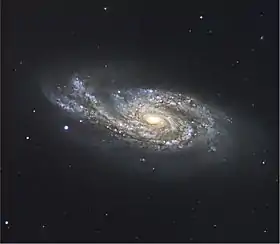NGC 908
NGC 908 is an unbarred spiral galaxy in the constellation Cetus. It is 60 million light years away from Earth. NGC 908 has vigorous star formation and is a starburst galaxy. The galaxy has a three-arm spiral pattern; two of its arms have peculiar morphology. The galaxy has a bright central bulge. Clusters of young stars and star-forming knots can be seen in the arms. Starburst activity and the peculiar morphology of the galaxy indicate it had a close encounter with another galaxy, although none are visible now.[3] NGC 908 was discovered in 1786 by William Herschel. Two supernovae have been observed in NGC 908, SN 1994ai (Ic type, mag. 17) and SN 2006ce (Ia type, mag. 12.4).[4] It is the main galaxy in the NGC 908 group, which also includes NGC 899, NGC 907, and IC 223.[5]
| NGC 908 | |
|---|---|
 | |
| Observation data (J2000 epoch) | |
| Constellation | Cetus |
| Right ascension | 02h 23m 04.6s[1] |
| Declination | −21° 14′ 02″[1] |
| Redshift | 1509 ± 5 km/s[1] |
| Distance | 56.0 ± 5.7 Mly (17.2 ± 1.8 Mpc)[1] |
| Apparent magnitude (V) | 10.83[2] |
| Characteristics | |
| Type | SA(s)c [1] |
| Apparent size (V) | 6′.0 × 2′.6[1] |
| Other designations | |
| MCG-04-06-035, PGC 9057[2] | |
References
- "Results for NGC 908". NASA/IPAC Extragalactic Database. Retrieved 2006-11-18.
- "Your NED Search Results". NASA/IPAC Extragalactic Database. Retrieved 2020-11-09.
- "The Starburst Galaxy NGC 908". ESO. 26 July 2006. Retrieved 9 November 2020.
- "List of Supernovae". IAU Central Bureau for Astronomical Telegrams. Retrieved 29 December 2015.
- Dmitry Makarov and Igor Karachentsev (2011). "Galaxy groups and clouds in the local (z∼ 0.01) Universe". MNRAS. 412 (4): 2498–2520. arXiv:1011.6277. Bibcode:2011MNRAS.412.2498M. doi:10.1111/j.1365-2966.2010.18071.x. Retrieved 1 January 2016.
External links
 Media related to NGC 908 at Wikimedia Commons
Media related to NGC 908 at Wikimedia Commons
- NGC 908 on WikiSky: DSS2, SDSS, GALEX, IRAS, Hydrogen α, X-Ray, Astrophoto, Sky Map, Articles and images
